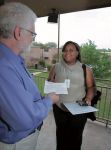In about two weeks, the U.S. government will begin mailing out census forms and it is sparing no expense to ensure the 2010 census is the most complete ever. Part of that includes a broad outreach effort to the country’s minority communities, where past responses have been less complete.
In Allegheny County, said U.S. Census Bureau Media Specialist Pamela Golden, the outreach effort includes some 450 partner organizations. Some of these include churches, community-based organizations, libraries, media companies and local government.
 |
| FOLLOWING UP— In April, census takers will begin going door-to-door to follow up with households that did not return their census forms.
|
“It is critical to achieve a complete count because not only does the information determine our number of representatives in congress, but it also helps to determine how federal resources are allocated,” said Golden. “It’s used for community planning and economic development. It’s about where roads go, where schools are built. Even the allocation of H1N1 vaccine was based on the census.”
According to the census website, www.2010census.gov, the count affects the allocation of more than $400 billion in federal funding annually for hospitals, Job training and senior centers, schools, emergency services and public works projects.
Urban League of Pittsburgh President and CEO Esther Bush serves on the joint city-county census committee and called census participation by the Black community “critical.” During the Feb. 21 Urban League Sunday event at Pentecostal Temple, Bush handed out literature and more than 400 census t-shirts to attendees
“I included census participation in my remarks because it is an opportunity for the U.S. government to count us as we are truly represented,” she said. “The more representation we have, the more money we get for schools and social services. The Pittsburgh Public Schools allocation is entirely based on the census. It is critical for us to get our fair share.”
Bush also said individuals have a responsibility to understand that filling out the census form truthfully “will not hurt anybody if they participate, but will help them, their neighbors and their community.
“By that I mean, if you live in public housing and have someone living with you who’s not on the lease, it’s okay to list them on the census—the (U.S. Dept of Housing and Urban Development) and the housing authority will not find out about it,” she said.
Like the Urban League, the NAACP is also working to make ensure an accurate count of African-Americans with its “Yes We Count” campaign. In this initiative, volunteers will go door-to-door preparing residents for the arrival of their Census form and will follow-up to remind residents to return them. The NAACP will use automated texting and phone banking programs to alert households that canvassers will visit their homes if they have not returned their forms.
“The NAACP has a vested interest in ensuring that hard to count populations are educated about and ultimately counted during the 2010 Census,” said national NAACP President Ben Jealous. “It is our mission to ensure that traditionally undercounted communities have access to the necessary funds, services, political representation, public infrastructure and private investment impacted by the census count.”
Another point these organizations are driving home is the simplicity of the census questionnaire. It has only 10 questions:
How many people live in the house; list them; what are their ages; what are their sexes; what are their races; do you own the house or not; we there any other people living were you forgot in question one; what is the household phone number; Is the head of the household Latino; does the head of the house sometimes live elsewhere?
While there are those who find anything beyond a simple count of persons in a household to be intrusive, there is another part to the census that some say is an invasion of privacy that they will not respond to at all. It is the 28-page American Community Survey.
Among some of the things it asks are:
•How many cars do you have at your house?
•Do you have a flush toilet?
•Do you have a sink with a faucet?
•Are you covered by a health insurance plan? Which type?
•Do you have serious difficulty hearing, seeing, concentrating, remembering, or making decisions?
•What is your retirement/pension?
•What’s the most important thing you do at work?
The ACS will be randomly mailed to 3 million households. And while respondents may be loath to give private financial information to the Census Bureau when the Internal Revenue Service already has it, Golden said that is another example of the privacy constraints in the system. The bureau doesn’t share individuals’ information, nor can they request data on individuals, so they must ask for it.
“We don’t work with the IRS to ask what a person makes,” she said. “It’s for statistical purposes. There’s no reason to say ‘John Doe makes this salary and lives here.’ But if there’s an increase in people below the poverty level and you don’t know about it, how can you plan for it?”
The bureau wants to impress on people the need to return their census forms by April 1 which has been designated Census Day. Between May and July, census takers will follow up with households that did not return their forms. The count will be delivered to President Obama Dec. 31.
(Send comments to cmorrow@newpittsburghcourier.com.)